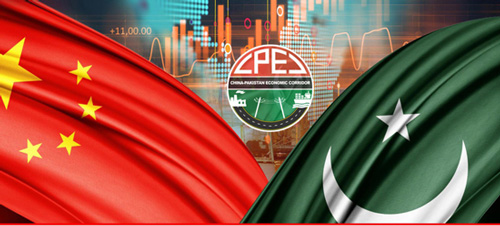Mohammad Jamil
THE Chinese Embassy in Pakistan took exception to the irresponsible remarks by outgoing US Principal Deputy Assistant Secretary of State for South and Central Asia, Alice Wells, who tried to spoil China-Pakistan relations. A day earlier, Wells had once again criticized China’s Belt and Road Initiative (BRI) and CPEC during an online media briefing, and had urged Beijing to relieve the countries involved in these undertakings of, what she said, its predatory loans. Wells had reiterated that the US was concerned about CPEC projects because of a lack of transparency, and the unfair rates of profits that are guaranteed to Chinese firms involved in their execution. The Chinese Embassy called her statement totally baseless and said: “We take Pakistan as an equal partner and never asked Pakistan to ‘do more’. We support Pakistan’s own model of development and never intervene in its domestic affairs”.
CPEC is an important project between the governments of China and Pakistan, and is a symbol of cooperation between the two countries. “The planning and implementation of the projects are carried out by the two sides through thorough consultations based on equality and scientific study. The Chinese companies under the project are all leading companies in their respective sectors and operate in full compliance with local laws and regulations,” the statement said. Since its implementation, CPEC has so far invested $25 billion and created more than 75,000 jobs in Pakistan. In the next stage of the project, both sides will strength cooperation on healthcare, industrial development, agriculture and education; thus CPEC will give a new impetus to Pakistan’s economic revival even in the post Covid-19 period.
In an atmosphere of doom and gloom vis-à-vis Coronavirus, the nation has something to rejoice. Progress in construction of New Gwadar International Airport (NGIA) continues according to time schedule, and is to be completed in 2022. The other good news is that award of contract for Diamer-Bhasha Dam has been awarded, which is to be completed by 2028. The Water and Power Development Authority (WAPDA) awarded the contract for civil and electro-mechanical works on Wednesday. As per details, an agreement worth Rs.442 billion with a joint venture of PowerChina-FWO was signed the other day for the construction of diversion system, main dam, access bridge and 21MW Tangir Hydropower Project. China has been the major source of FDI for Pakistan in the past five consecutive years. While according to the Board of Investment, the FDI from the USA to Pakistan was a bit over $1billion between 2012 and 2019.
In 2005, the US had promised to establish Reconstruction Opportunity Zones in erstwhile FATA with a view to providing boost to the local industry and provide jobs to people affected by the war on terror and also to earthquake-affected people of the Hazara region. Under the proposal, the US was to set up industrial units in FATA and earthquake-hit areas as part of the ROZs and facilitate tax-free export of products to the United States. Additionally, local people were to get jobs on a priority basis in the industrial units. The idea of providing employment to the local population was meant to end terrorism. But the US backtracked on its promises, and Pakistan was left alone to bear the burden of rehabilitating the displaced persons. The list of betrayals by the US is long, and it ditched Pakistan after achieving its objectives; and after the (former) Soviet Union’s demise, the US started applying sanctions.
Anyhow, since the COVID-19 outbreak, there is zero infection on CPEC projects due to strict measures taken by the two sides. The Chinese companies did not suspend construction nor did they lay off a single local staff. The CPEC projects have secured local employment and kept contributing to Pakistan’s economy. The energy projects are generating 1/3 of the electricity for Pakistan now. The Phase-II of KKH is almost ready for traffic. The integrated test and commissioning for the Lahore Orange Line have been successfully completed. The construction of the new airport in Gwadar entered into the second phase. Gwadar has become an economic hub for Baluchistan. All Chinese companies working for the CPEC have generously donated medical assistance to Pakistan in the current difficult situation. Over 20,000 Pakistani students are studying in China on scholarships provided by the Chinese government and universities.
China knows the impact of the COVID-19 on Pakistan’s economy and is sparing no effort to help Pakistan address the challenge. According to the State Bank of Pakistan, its debt from multilateral institutions amounts to about 47% of its total external debt, while loans from the CPEC is only $5.8 billion, 5.22% of the Pakistan’s total debt. It has no pressure on Pakistan at all. Recently, the G-20 members adopted a Debt Service Suspension Initiative for the poorest countries. China supported Pakistan to be included and is ready to provide relief. China will never force Pakistan to pay back the debts and China’s loans have no strings attached.
While China and Pakistan are cooperating to prevent and control the epidemic, China sent a group of experts to Pakistan to combat menace of the locust. China has donated 300 tons of Malathion and 50 air-powered high-efficiency remote sprayers to Pakistan in this regard. The level of trade liberalization between the two countries has increased with tariffs further reduced. In addition, China and Pakistan are working together to promote the peace process in Afghanistan and provide humanitarian assistance to Afghan refugees in Pakistan. China also opposes the politicization of the International Financial Action Task Force (FATF) and is working with Pakistan to strengthen its capacity. But the US is wary of Chinese strategic access to the Arabian Sea and its presence in the region. Reportedly, the US tried several times to persuade Pakistan against involving China in the mega project but Pakistan remained firm on its commitment to China.










